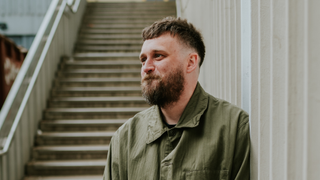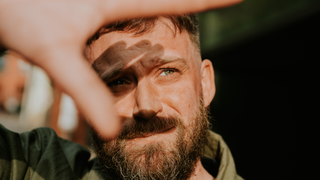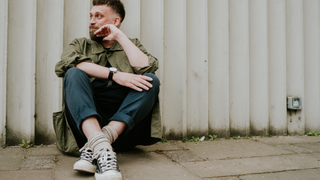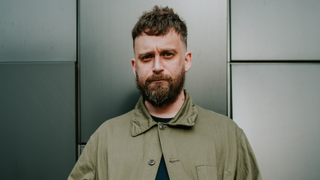Equally adept at producing music for immersive headphone listening or ecstatic dancefloor exaltation, Matt Cutler is a staple of the UK electronic music scene.
In the five years that have passed since his last release, he’s switched labels, moving over to London-via-Berlin collective Greco-Roman, and developed a new approach that weaves dream-pop vocals into richly textured electronica, drawing inspiration from My Bloody Valentine and Cocteau Twins.
Cutler joined us to talk through his creative process and studio set-up, giving us an insight into the ideas and instruments behind his new record, Always In Your Head.

When did you first get involved with music production?
“Well it definitely goes back a long way. I'd been messing around with toy keyboards and tape recorders from the age of about nine, but I honestly don't know if you could class what I was doing back then as 'music production'.
“I got a computer game called Music for the PlayStation in 1999 which was a super basic sequencer, and you could also write little tunes and stuff on it, so I guess that was my proper introduction to how electronic music was actually made.
“By 2001 my family had bought a PC and I quickly downloaded a demo of FL Studio, or Fruity Loops as it was known back then.
Happy to say I'm still using FL Studio as the main brain of my studio all these years later
"Pretty much the same set up as the Music game really, so I was able to hit the ground running and started obsessively making my own tunes straight away. Happy to say I'm still using FL Studio as the main brain of my studio all these years later.”
When and how would you say you became successful, or at least able to make a living from music?
“Well, in terms of 'success' I kinda felt that around 2002 or 2003. By that time I honestly started to feel like my tunes were getting somewhere. It started to become my favourite music, and I'd happily listen to whatever it was I'd just finished all day. That was a big aim when I started out.
“In terms of any kind of financial success, that wouldn't happen for a long time after. I quit my crappy part time job around 2010 and moved from my hometown of Nottingham to Manchester to take it up full time.
"Me and my mate had just set up the Magicwire label and put out the “Pineapple Crush” 12'', and that was the tune that finally seemed to click with people. Enough bookings for live and DJ sets were coming in, so I just ran with it and didn't look back.”

What is your overall philosophy or approach when it comes to music (playing, recording, production)?
“It's incredibly simple to be honest with you: just make the music you want to hear. Everything else is secondary to that. There is no greater feeling in my life than when a piece of music I'm working on starts to take shape.
“For me, I have to be totally moved by what I'm working on long before anyone else in the world hears it. If you're trying to make music for other people or to try and follow trends, I honestly don't think it lasts... I think the key to proper longevity seems to be: make the music that moves you most and all the other shit will follow.”
Tell us about the rest of the gear in your studio.
“To be honest, I've always kinda come from the laptop musician school of keeping it mostly in the box... so it's tons of plugins that I've collected for the best part of 20 years, and FL Studio.
There is no greater feeling in my life than when a piece of music I'm working on starts to take shape
“I'm looking around now though and amidst the absolute mess that is my studio I can see an old Yamaha DX7, mainly used for the Rhodes preset for when I've been trying to capture that ‘80s movie / Spielbergian vibe in my tracks... [laughs]
"Roland SH-01A, as I couldn't justify spending the money trying to get an original 101, but wanted to get those glorious lead sounds down. Novation Ultra Nova which has been good for live stuff, an old Akai MPC2000XL, Akai APC40, Akai MPX16, a battered Roland SP404 not used since the 'Lemurian' days, though, I do often think about bringing that back.
“Two Technics SL-1210MK7 turntables, two Pioneer 2000NXS2 CDJs going into a Pioneer DJM-850. A couple of Rode NT1A mics which I've used for literally every found sound / percussion or vocal recording on any of my tracks.
"M-Audio controller keyboard, two Adam A7X monitors going into a Focusrite Scarlett 18i20 interface. A cheap bass guitar, an electric guitar... oh, and boxes of crappy little percussion instruments, shakers and bits of homemade things I can bash to make noise out of.”
What are your favorite 5 plugins?
“Honestly, I'd really rather prefer to keep specific plugins to myself as not to give TOO much away but I would say that a great deal of what I always use when I'm working on tunes are the FL stock plugins!
“EQ and reverb are by far my most used and I just know this stuff like the back of my hand. Sure there are tons of endlessly fancier plugins you could use but I really just want to stress that it's not what you use but how you use it... I've always kept it incredibly basic and those limitations have pushed me to be more and more creative over the years.”
How does a track typically start structure wise and then progress?
“Over the years it's changed so much, and will change generally from track to track these days, but I'd say that generally I'll start with chords. I'll try and lay down a progression that moves me and then let my brain respond to whatever the chords tell it to. Usually melodies will spring to mind from there and I'll start to jam those over the top.
My major strength as an artist is the ability to respond to quite small or basic elements. Like, if I have some nice chords, I find it so easy to come up with the rest from there
“I'll chuck in a random drum break to guide all this usually and gradually build it up from there. I definitely feel like my major strength as an artist is the ability to respond to quite small or basic elements.
"Like, if I have some nice chords, I find it so easy to come up with the rest from there. It starts to snowball really quickly. It's just getting to that starting point that can be tricky.”
How do you know when a track is finished or what advice do you have to complete a track?
“The track is finished when I can listen to it without wanting to change anything. I often fall into the trap of finishing a track, exporting it and thinking I'm done with it only to then listen back the next day and realise there's slight tweaks needed - or sometimes whole changes!
“I guess I'm quite an impatient person so I always want to finish the track and move on to something new. What ends up happening is, I'll listen back to what I've done the next day and realise there's elements that could be better, then go back in and alter whatever it is that stuck out to me.
“It'd be much better to walk away from a track for a breather, when I think I'm done with it and go back the next day with fresh ears because I often end up with about 50 mixes of a track. Sometimes they come out quickly though, and they're always the ones I won’t touch afterwards. There's something about catching a vibe quickly and then moving on which has always appealed to me.”

Talk us through one or two influences behind the new album.
“Musically I wanted to capture the way Kevin Shields production on the My Bloody Valentine records, or the way Liz Fraser's voice glistens on the Cocteau Twins records, make me feel when I listen to them. So, it wasn't a case of trying to copy either band's music or trying to sound like them, but more a case of trying to capture the way they make me feel.
“So it was a case of listening deeply and learning about how I could apply that to what it is that I do. Tons of breakbeats, lush lead melodies and deep ambient textures... backed up with the most beautiful chords I could come up with, but with the addition of a big dose of hazy Kevin Shields-esque noise.
“A beautiful uneasiness to the tone and lush vocals that are much more about melody than specific meaning, so, using vocals more as an instrument - like another synth but a thousand times more organic.”
If you’ve been involved in collaborations for this project, tell us about how those went?
“Yeah, I knew this album had to have female vocals. The tracks that I was writing were kind of screaming it out to me. I was becoming obsessed with Cocteau Twins and Bilinda Butcher's vocals from My Bloody Valentine, and wanted to expand my sound to try and capture a similar feeling to what I was getting through that music.
Using vocals more as an instrument - like another synth but a thousand times more organic
“I mentioned this to my mate Chris and he played me a few tracks he'd made with a friend of his, Morgane Diet. I'd explained to him what I was going for and he basically said something like “yeah she's amazing, kind of like Bjork at times”, and the tracks he played me were lush. Her voice stood out as pretty much exactly what I was imagining.
“Cut to a few months later and he's put us in touch through email. I started sending her little chord progressions and basically asking her to sing what came to her... I wasn't too bothered about lyrics particularly, it was much more important to me to get a feeling in the melodies - words weren't important as I knew she could communicate so much more this way.
“She'd sent me back folders full of clips - melodies she'd sung over the chord progressions I'd given her. From there I'd build songs around them. It became like the world's most insane puzzle trying to piece together the best bits over what I was working on.
"The vocals really made me respond in totally different ways than I would have done just working on my own and it was so exciting as the tracks started to come together.”
How are you planning to translate this project into a live setting?
“This is what I'm heavily in the middle of right now. The first live show is on November the 28th at Village Underground. I'll be bringing Chris Boot with me, who I mentioned. He's an amazing drummer. We toured the last album, Levitate, together. We'll be meeting up soon to jam some ideas - it really breathes new life into the tunes to have his live drums going off next to me on stage. It makes me improvise in different ways as well, which is exciting.
“From my end I'm basically building this massive Ableton project which I'll be controlling with a couple of Akai MIDI controllers. I'll be triggering and tweaking MIDI chord progressions from the tracks with a couple of synths, I’m still not 100% sure which I'll be taking out yet.
“I'll have the SH-01 there to tweak lead melodies live, and will basically be triggering hundreds of clips in real time. I've remixed most of the tracks and have them totally broken into tiny bits and MIDI keys and stuff, so I'll basically be building tunes live on stage which is something I've always kind of wanted to do, but never found the best way of doing it.
“It's so exciting to see it coming together so I'm really looking forward to the show and to taking it on the road next year.”
What is on your wishlist studio gear wise?
“Honestly, I'm so content with my messy little set up. You could take everything away from me but leave the laptop and I'm confident I could make interesting music quite happily for the rest of my life. Having said that, If anyone wants to buy me a Yamaha CS80 or 70M I would not be complaining. The holy grail for me.”
What would you like to see developed in terms of studio technology and why?
“Some sort of Neuralink type shit, which would cut out the middle man of actual studio gear and mean you could just imagine tunes into existence. That's always been the dream for me. I mean, I'm quite lazy, so I guess it'd suit me, but it's more the fact that I reckon most of my music sounds better in my brain than the stuff I'm actually capable of producing.
Try and imagine the best music in the world and then spend your life trying to be a good enough artist that you can bring it into existence
“It's always been that way to be honest. I am getting closer to bridging the gap though. I think that technology is probably not as far off as you'd think. Next hundred years we'll see mad leaps like that I think. As long as we don't blow ourselves up in the meantime.”
What advice can you offer others who are starting out in music production?
“Going back to what I was talking about earlier, honestly, I'd just tell anyone starting out to just try and make the music they'd like to hear in the world. Try and imagine the best music in the world and then spend your life trying to be a good enough artist that you can bring it into existence.
“I think people need to find their own way when it comes to art though. I wouldn’t want to influence a younger artist and take them off a path more suited to them. Maybe my advice would be: don't listen to advice! Do what feels right and don't overthink.”
What track by any other artist do you wish you had produced?
“Great question. I have so many... “Honey Power” by My Bloody Valentine. Specifically the outro section that comes in after the track is over. I think that is the most perfect piece of music I've ever heard. “Everything You Do Is A Balloon” by Boards Of Canada is a pretty perfect track. I'd definitely feel pretty good having come up with that.”
Finally, what else have you got planned for the near future?
“Getting the Village Underground live show done is the first mountain I have to climb, so at the moment I'm not seeing anything too far beyond that. I'd like to get back into making tracks in December though.
"I have a bunch of things I started at the beginning of 2021 that I'd quite like to try and tie up before Christmas. Also I'm toying with the idea of putting out an EP of straight-up club music to follow up the album, so ideally I'd like to get bang on that as quickly as possible.”
Lone's Always Inside Your Head is out now on Greco-Roman.


